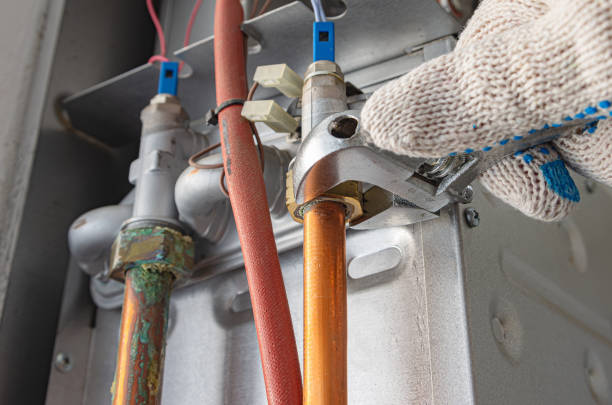If you’re experiencing a drop in pressure when running hot water from your combi boiler, you’re not alone. This is a common issue that many homeowners face, and it can be caused by a variety of factors.
One of the most common causes of a drop in pressure when running hot water is a faulty pressure relief valve. This valve is designed to release excess pressure from the system, but if it’s not working properly, it can cause a drop in pressure. Another possible cause is a leak in the system, which can cause water to escape and lead to a drop in pressure. It’s important to identify the cause of the issue in order to fix it properly and prevent further damage to your system.
If you’re unsure of the cause of the pressure drop, it’s best to call in a professional plumber to diagnose and fix the problem. Attempting to fix the issue on your own can be dangerous and may cause further damage to your system. A qualified plumber will be able to identify the cause of the issue and provide a solution that will restore your combi boiler to full working order.
Understanding Combi Boiler Pressure Drops
If you’re experiencing a drop in pressure when running hot water from your combi boiler, you’re not alone. This is a common issue that can be caused by a number of factors. Understanding the reasons behind pressure drops can help you diagnose the problem and take the necessary steps to fix it.

Causes of Pressure Drops
There are several reasons why your combi boiler may be experiencing a pressure drop when running hot water:
- Leaking pipework: Leaks in your pipework can cause pressure drops. Check for any visible leaks or damp patches around your boiler or radiators.
- Faulty pressure relief valve: The pressure relief valve is designed to release pressure when it gets too high. If it’s faulty, it may release pressure too frequently, causing a drop in pressure.
- Expansion vessel issues: The expansion vessel is responsible for absorbing excess pressure in your system. If it’s not functioning correctly, it can cause pressure drops.
- Blocked heat exchanger: If your heat exchanger is blocked, it can cause a drop in pressure. This is because the water can’t circulate properly.
- Low water pressure: If the water pressure in your system is too low, it can cause a drop in pressure. Check your pressure gauge to ensure it’s at the correct level.
Solutions to Pressure Drops
The solution to your pressure drop will depend on the cause. Here are some potential solutions:
- Fix any leaks: If you have any leaks in your pipework, fix them as soon as possible to prevent further pressure drops.
- Replace the pressure relief valve: If your pressure relief valve is faulty, it will need to be replaced by a qualified engineer.
- Check the expansion vessel: If your expansion vessel is faulty, it may need to be recharged or replaced.
- Clean the heat exchanger: If your heat exchanger is blocked, it will need to be cleaned by a qualified engineer.
- Increase water pressure: If your water pressure is too low, you may need to increase it. Check your pressure gauge to ensure it’s at the correct level.
In conclusion, a pressure drop when running hot water from your combi boiler can be caused by a number of factors. By understanding the potential causes and solutions, you can diagnose and fix the problem quickly and effectively. Remember, if you’re unsure about any aspect of your boiler’s performance, always consult a qualified engineer.
Causes of Pressure Drops When Running Hot Water
If you are experiencing a drop in pressure when running hot water from your combi boiler, there are a few common causes that you should investigate. In this section, we will look at three possible causes of pressure drops when running hot water: a faulty pressure relief valve, a water leak, and a faulty expansion vessel.
Faulty Pressure Relief Valve
The pressure relief valve is an important safety feature of your combi boiler. It is designed to release pressure when it builds up to a dangerous level. If the valve is faulty, it may release pressure too frequently, causing a drop in pressure. This can be caused by a build-up of limescale or debris, or simply due to wear and tear over time.
If you suspect that the pressure relief valve is faulty, you should contact a qualified heating engineer to inspect and replace the valve if necessary.
Water Leak
A water leak can also cause a drop in pressure when running hot water from your combi boiler. This can be caused by a number of factors, including a faulty seal, a cracked pipe, or a corroded radiator. If you suspect that there is a water leak, you should inspect your boiler and heating system for any signs of water damage or dampness.
If you are unable to locate the source of the leak, you should contact a qualified heating engineer to investigate and repair the leak.

Faulty Expansion Vessel
The expansion vessel is an essential component of your combi boiler. It is responsible for regulating the pressure within the system, ensuring that it does not become too high or too low. If the expansion vessel is faulty, it may not be able to maintain the correct pressure, causing a drop in pressure when running hot water.
If you suspect that the expansion vessel is faulty, you should contact a qualified heating engineer to inspect and replace the vessel if necessary.
In conclusion, a drop in pressure when running hot water from your combi boiler can be caused by a number of factors, including a faulty pressure relief valve, a water leak, or a faulty expansion vessel. If you suspect that any of these components are faulty, you should contact a qualified heating engineer to inspect and repair your boiler.
Symptoms of Pressure Drops
If you are experiencing pressure drops when running hot water, there are several symptoms you may notice. These include:
Reduced Water Flow
One of the most common symptoms of pressure drops is reduced water flow. When the pressure drops, the water flow from your tap may slow down, making it difficult to use appliances like your shower or washing machine.
Inconsistent Water Temperature
Another symptom of pressure drops is inconsistent water temperature. When the pressure drops, it can cause fluctuations in the water temperature, which can be frustrating and uncomfortable.
Strange Noises
If you hear strange noises coming from your boiler or pipes, it could be a sign that the pressure has dropped. A gurgling or hissing sound can indicate that there is air in the system, which can cause the pressure to drop.
Low Boiler Pressure
Finally, low boiler pressure is a clear sign that there is a problem with your system. If the pressure drops below 1 bar, it can cause your boiler to shut down, leaving you without hot water and heating.
If you notice any of these symptoms, it is important to take action as soon as possible. Ignoring the problem can lead to further damage and more expensive repairs in the future.
Impact on Boiler Efficiency
When the pressure in your combi boiler drops when running hot water, it can have a significant impact on the efficiency of your boiler. Here are a few reasons why:
- Reduced flow rate: When the pressure drops, the flow rate of hot water will decrease. This means that it will take longer for your taps or shower to produce hot water, which can be frustrating. Additionally, if the flow rate is too low, your boiler may not be able to keep up with demand, resulting in cold water.
- Increased energy usage: When your boiler is struggling to maintain pressure, it may need to work harder to produce hot water. This can lead to increased energy usage, which can result in higher energy bills.
- Shorter lifespan: Over time, the increased strain on your boiler can cause it to wear out more quickly. This means that you may need to replace your boiler sooner than you would if it were operating under optimal conditions.
To mitigate these issues, it is important to address any pressure drops as soon as possible. This may involve checking for leaks, adjusting the pressure valve, or contacting a professional plumber to diagnose and repair the issue. By taking action quickly, you can help to ensure that your combi boiler operates efficiently and reliably for years to come.
Methods to Prevent Pressure Drops
If you are experiencing pressure drops in your combi boiler when running hot water, there are a few methods you can use to prevent this issue from occurring.
Regular Boiler Servicing
One of the most important ways to prevent pressure drops in your combi boiler is to schedule regular servicing. A qualified and experienced engineer can inspect your boiler and identify any potential issues before they become serious problems. Regular servicing can also help to ensure that your boiler is running efficiently, which can help to reduce the risk of pressure drops.
During a boiler service, the engineer will check the pressure levels and adjust them if necessary. They will also check for any leaks or blockages in the system that could be causing the pressure to drop. Regular servicing can help to keep your combi boiler in good condition and prevent pressure drops from occurring.
Proper Installation
Another important method to prevent pressure drops in your combi boiler is to ensure that it is installed properly. A poorly installed boiler can cause a range of issues, including pressure drops. If your combi boiler was not installed by a qualified and experienced engineer, it may be more prone to pressure drops.
When installing a combi boiler, it is important to ensure that it is the correct size for your home and that it is installed in the correct location. The engineer should also ensure that the system is properly balanced to prevent pressure drops.
In addition to proper installation, it is important to ensure that your combi boiler is maintained properly. This includes regular cleaning and checking for any signs of wear and tear. If you notice any issues with your boiler, it is important to address them promptly to prevent pressure drops from occurring.
By following these methods, you can help to prevent pressure drops in your combi boiler when running hot water. Regular servicing and proper installation can help to keep your boiler in good condition and prevent issues from occurring.
Conclusion
In conclusion, if you are experiencing a drop in pressure when running hot water from your combi boiler, there are a few things you can do to troubleshoot the issue.
Firstly, check for any leaks in the system, as this is the most common cause of pressure loss. You can do this by checking the pressure gauge on the boiler and looking for any visible signs of water leaks around the pipes and radiators.
If there are no leaks, check the pressure relief valve to ensure it is not faulty or stuck open. You can also check the expansion vessel to ensure it is properly charged and functioning correctly.
If these steps do not resolve the issue, it may be necessary to call in a qualified heating engineer to diagnose and repair the problem.
Remember, it is important to maintain the correct pressure in your combi boiler to ensure it operates efficiently and safely. Regular maintenance and servicing can help prevent issues from occurring in the first place.
By following these steps and seeking professional help if necessary, you can ensure your combi boiler continues to provide reliable hot water and heating for your home.
